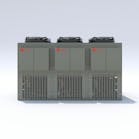Whew. A total of 161 meetings in about eight hours. Sounds like a speed dating event at an A.D.D. conference, doesn't it? HARDI members held 161 meetings with their House and Senate representatives in just one day during our 2010 Congressional Fly-In. During every one of those meetings, we told congressmen, senators or their staff just how vital energy-efficiency incentive programs are for HVACR distributors, manufacturers and contractors while providing huge benefits to homeowners, commercial buildings and the environment. HARDI's arguments for an extension of the 25C residential tax credits that expire at the end of this year are compelling, especially when delivered so passionately by distributor owners who saw their own profitability (or even viability) derive from this expanded tax credit: Home Star, Building Star, Accelerated Depreciation. All of these federal energy-efficiency incentive programs (despite many of their flaws) are certain to deliver an economic boost to our members and your customers; most of the offices that HARDI members visited in May agreed … with a catch.
I wrote this three days after the national debt exceeded $13 trillion, with this current year projected to add at least another $1 trillion to the debt by October. While much easier to ignore earlier this year when "hope and change" were expected to render the laws of economics null and void, these truly alarming debt and deficit figures, coupled with the general failure of the massive stimulus bill to get people back to work, are causing even the most ardent supporters of energy efficiency and environmental policy to question billions of dollars more in federal spending. The actual costs of the expanded 25C tax credits are still unknown at this time, but at $1,500 a pop, it doesn't take long for the zeros to start adding up. Home Star and Building Star were proposed at $6 billion each, and the current score (estimated cost) of reducing the depreciation period for HVACR products starts at $4 billion. The question isn't whether these are good programs for growing businesses and saving energy, it is "how are you going to pay for it?"
Behind the earliest conceptions of a "green jobs bill" (that would include the two "Star" bills) was the assumption of many Democrats that unused Targeted Asset Relief Program (TARP) funds would provide the pay-for. Republicans immediately questioned the "TARP-as-a-piggy-bank" concept and fired back that such programs are more like stimulus money and, therefore, unspent ARRA funds should pay for it. As it turns out, though, almost all of the ARRA funds are already appropriated, but the never-ending bureaucratic red-tape (especially the ridiculous prevailing wage and EPA sustainability requirements) have simply made it all but impossible for states to physically receive the ARRA funds for which their projects and programs have already been approved.
Many of the congressional office staffers who met with HARDI members during this year's Fly-In fully want to include an extension of the 25C tax credits in the 2010 "extenders bill"; however, as of June 10, 2010, the 2009 "extenders bill" has not been completed yet. With major outstanding legislative agenda items — such as climate and energy legislation and financial regulatory reform, to name a few — still pending, it is hard to envision another vehicle for a 25C extension. HARDI will certainly try to secure such an extension, but the political drama of an election year, coupled with Washington's fiscal irresponsibility to date, must force our membership to start considering a 2011 that will start without any significant federal energy-efficiency incentives.
The work done during May's 161 meetings, and the nearly 300 meetings that took place during the two previous Congressional Fly-In's, has certainly not been in vain, though. As a result of this year's Fly-In, I had direct access to major Ways and Means Committee members who remembered meeting with HARDI and got me answers to key questions within 10 minutes of my call. While energy-efficiency policy isn't going our way right now, we helped renew momentum for long-term estate tax relief and convinced more legislators that LIFO repeal is counterproductive. Today's fiscal realities will probably grind Washington to a spending halt for the rest of 2010 (not all bad), but May's effective advocacy likely went a long way toward moving 25C extension higher on the 2011 priority list.
Talbot Gee is vice president of HARDI. Contact him at 614/345-4328 or [email protected].








